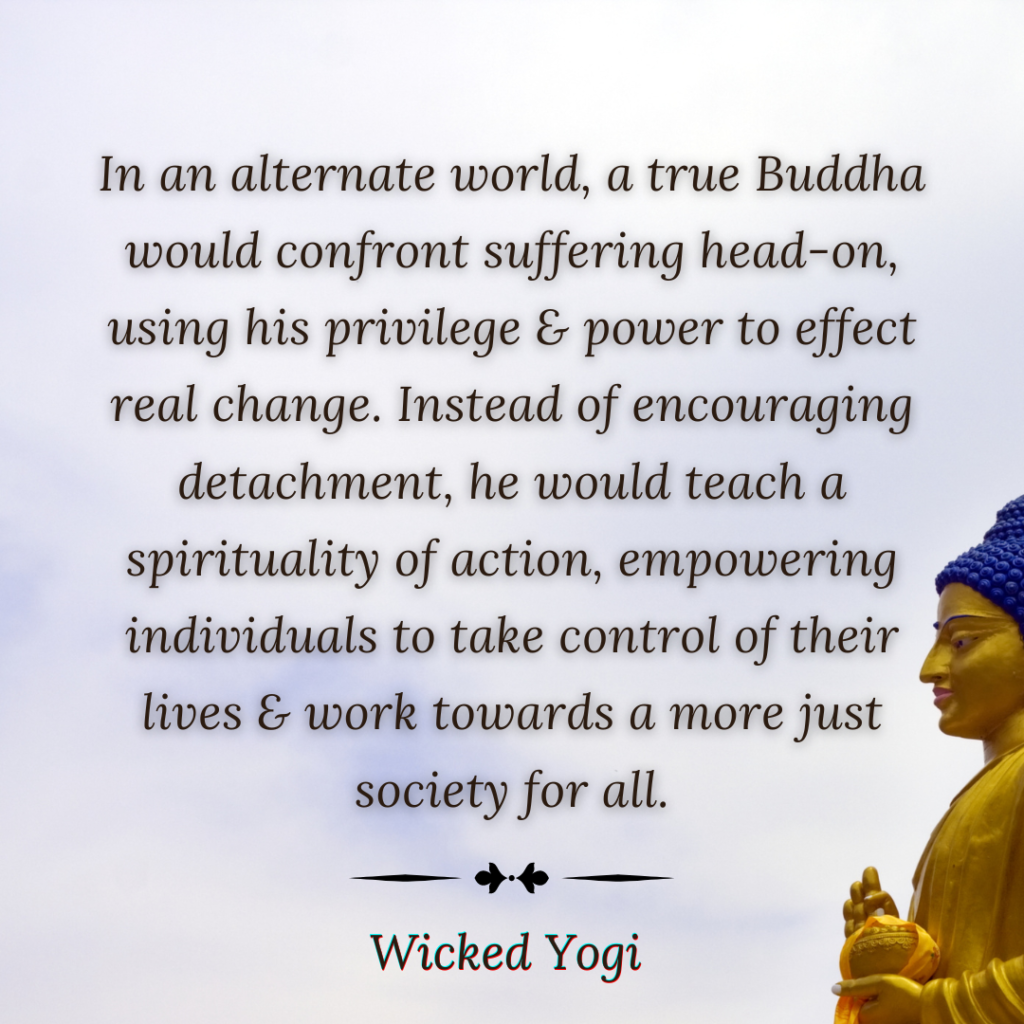As an enlightened yogi dedicated to providing holistic assistance to those seeking spiritual guidance, I have delved deep into the life and teachings of Siddhartha Gautama, better known as the Buddha. While I acknowledge the historical significance of his work and the impact it has had on countless individuals throughout the ages, I cannot help but question the practicality and relevance of his primary philosophy, not only in the context of our modern world but also in the time and place in which he lived.
To fully understand the limitations of Buddha's teachings, it is essential to examine the circumstances that led him to embark on his spiritual journey. Born as a crown prince, Siddhartha was sheltered from the harsh realities of life by his father, King Suddhodana. The king went to great lengths to protect his son from witnessing the suffering that plagued his kingdom, creating an artificial bubble of happiness and prosperity within the palace walls. It was only by chance that Siddhartha discovered the truth about the world beyond his privileged existence. When he learned about the inevitability of death and the pervasiveness of suffering, he was thrown into a state of profound shock and introspection. The realization that life was not the idyllic paradise he had believed it to be left him grappling with existential questions that had no easy answers.
However, while Siddhartha's existential crisis is understandable given his sheltered upbringing, his response to this newfound knowledge is less so. Instead of using his privileged position to alleviate the suffering of his people, he chose to abandon his wife and young child in pursuit of personal enlightenment. One cannot help but wonder how different the course of history might have been had Siddhartha chosen to use his power and influence to ease the burden of his subjects, perhaps by lowering the taxes that left them impoverished and struggling.
“To fully understand the limitations of Buddha’s teachings, it is essential to examine the circumstances that led him to embark on his spiritual journey.”
Siddhartha's odyssey of self-discovery was an arduous journey marked by years of extreme asceticism and unrelenting self-denial. He subjected himself to a panoply of practices, ranging from the most severe forms of starvation to the most indulgent acts of gluttony, all in the quest for the ultimate truth. Yet, the answer he ultimately arrived at - the theory of the cycle of life and birth - was little more than a deft repackaging of ideas that had long been present in the ancient Hindu texts. The profound concepts of Karma and Liberation had been extensively explored and expounded upon by these venerable scriptures long before Buddha ever set foot on the stage of history.
Moreover, Buddha's claims, despite their apparent profundity, were not supported by any real-life events that he could enact or recreate. His teachings were simply based on the power of his word and the unwavering belief of his devoted followers. In a time when life was unimaginably difficult, with starvation, disease, and oppression being the inescapable realities of daily existence, it is hardly surprising that so many men found solace in joining Buddha's ever-growing camp of followers. By renouncing their worldly responsibilities and embracing a life of asceticism and detachment, they could escape the relentless grind of their impossible lives, finding a measure of peace in the promise of spiritual liberation. However, while Buddha's flock may have steadily increased, swelling with the ranks of those seeking escape from the sufferings of the world, one cannot ignore the ripple effect of suffering that this mass exodus of men likely caused among those who were dependent on them. Wives, children, and elderly parents were left to fend for themselves in a world that was already brutally unforgiving, their lives made all the more precarious by the absence of their male providers. In this regard, Buddha's teachings, while offering a temporary escape from suffering, did little to address the root causes of that suffering or to improve the material conditions of people's lives. His message of detachment and renunciation, while undoubtedly appealing to those seeking spiritual solace, failed to provide a practical solution to the very real problems of poverty, disease, and oppression that plagued the society of his time.
"One cannot ignore the ripple effect of suffering that this mass exodus of men likely caused among those who were dependent on them.”
It is important to recognize that Buddha was a product of his time, and his teachings were a response to the particular challenges and hardships of ancient India. In a world where life was often nasty, brutish, and short, the idea of transcending suffering through detachment and acceptance may have held a certain appeal. However, even in this context, Buddha's decision to turn his back on his family and his kingdom can be seen as a form of escapism rather than a genuine solution to the problems of his time. One cannot help but wonder if Buddha's spiritual journey was not, in fact, prompted by a serious and debilitating mental breakdown. The shock of discovering the reality of suffering after a lifetime of sheltered privilege may have been too much for him to bear, leading him to abandon his responsibilities and seek solace in a life of asceticism and self-denial.
In an alternate world, a true Buddha would be one who confronts suffering head-on, using his privilege and power to effect real change in the lives of his people. Rather than encouraging detachment and withdrawal from the world, he would teach a spirituality of action, empowering individuals to take control of their own lives and destinies and to work towards creating a better, more just society for all.
"Buddha's spiritual journey was shaped by ancient challenges, but real enlightenment comes from engaging with life's struggles, using our strengths to drive societal progress, and uplifting others."
In conclusion, while Buddha was undoubtedly a special man in his time, his teachings were not as revolutionary or as practical as they may have seemed. Many of his ideas were borrowed from existing Hindu texts, and his claims were not supported by any real-life evidence or demonstrations of their efficacy. While his message of detachment and acceptance may have offered temporary solace to those suffering under the yoke of ancient India's many hardships, it did little to address the root causes of that suffering or to offer a genuine path towards liberation. As we seek spiritual guidance in the modern world, we must be cautious of teachings that encourage escapism or detachment from the realities of our lives. True enlightenment, I know, comes not from withdrawing from the world but from engaging with it fully, using our wisdom, compassion, and understanding to create positive change and to alleviate the suffering of others. Only by taking responsibility for our own lives and the lives of those around us can we hope to create a world that is truly just, compassionate, and free from suffering.






